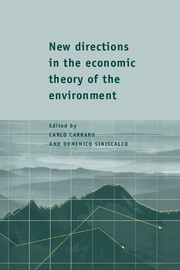Book contents
- Frontmatter
- Contents
- List of contributors
- 1 Theoretical frontiers of environmental economics
- 2 Growth with natural and environmental resources
- 3 Environmental policy and technological innovation
- 4 Environmental policy, distortionary labour taxation and employment: pollution taxes and the double dividend
- 5 International coordination of environmental taxes
- 6 Environmental policy and international trade
- 7 Environmental regulation and international capital allocation
- 8 Towards a theory of international environmental cooperation
- 9 Group formation in games without spillovers
- 10 Non-cooperative models of coalition formation in games with spillovers
- Index
1 - Theoretical frontiers of environmental economics
Published online by Cambridge University Press: 11 January 2010
- Frontmatter
- Contents
- List of contributors
- 1 Theoretical frontiers of environmental economics
- 2 Growth with natural and environmental resources
- 3 Environmental policy and technological innovation
- 4 Environmental policy, distortionary labour taxation and employment: pollution taxes and the double dividend
- 5 International coordination of environmental taxes
- 6 Environmental policy and international trade
- 7 Environmental regulation and international capital allocation
- 8 Towards a theory of international environmental cooperation
- 9 Group formation in games without spillovers
- 10 Non-cooperative models of coalition formation in games with spillovers
- Index
Summary
Environmental economics was the subject of a comprehensive research programme in the 1960s and 1970s. This programme dealt with a wide range of issues and policy problems, such as the economics of natural resources, the methods and problems in the correction of externalities, the management of common property goods, the economics of nature preservation. Against this background, suitable analytical tools were provided by the theory of non-renewable and renewable resources; the theory of missing markets; Pigovian taxation and the theory of property rights; the economics of public goods; welfare economics. All in all, the research programme was very successful and in the following decade it gave rise to several textbooks, from Baumol and Oates (1975) to Siebert (1987), Pearce and Turner (1990). At the beginning of the 1990s, no less Partha Dasgupta (1990) was claiming that environmental issues were ‘very cold’ as topics for analytical investigation and ‘dead’ as research problems.
In recent years, however, scientists have highlighted a set of ‘new’ environmental phenomena, such as global warming, ozone layer depletion, acid rains, fresh water and ocean pollution, desertification, deforestation and the loss of bio-diversity (e.g., cf. UNEP (1991)). Some of the above phenomena, such as ozone layer depletion, were newly discovered; some others were known, but attracted new attention, due to their scale and socio-economic implications, such as global warming. In both cases, the new environmental problems entered the agenda of policy makers and became the centre of world-wide debate and a massive diplomatic effort, culminating in the UN Conference on Environment and Development, held in Rio de Janeiro in 1992 (for a discussion, see World Bank (1992), Siniscalco (1992), IPCC (1995)).
- Type
- Chapter
- Information
- Publisher: Cambridge University PressPrint publication year: 1997
- 1
- Cited by



